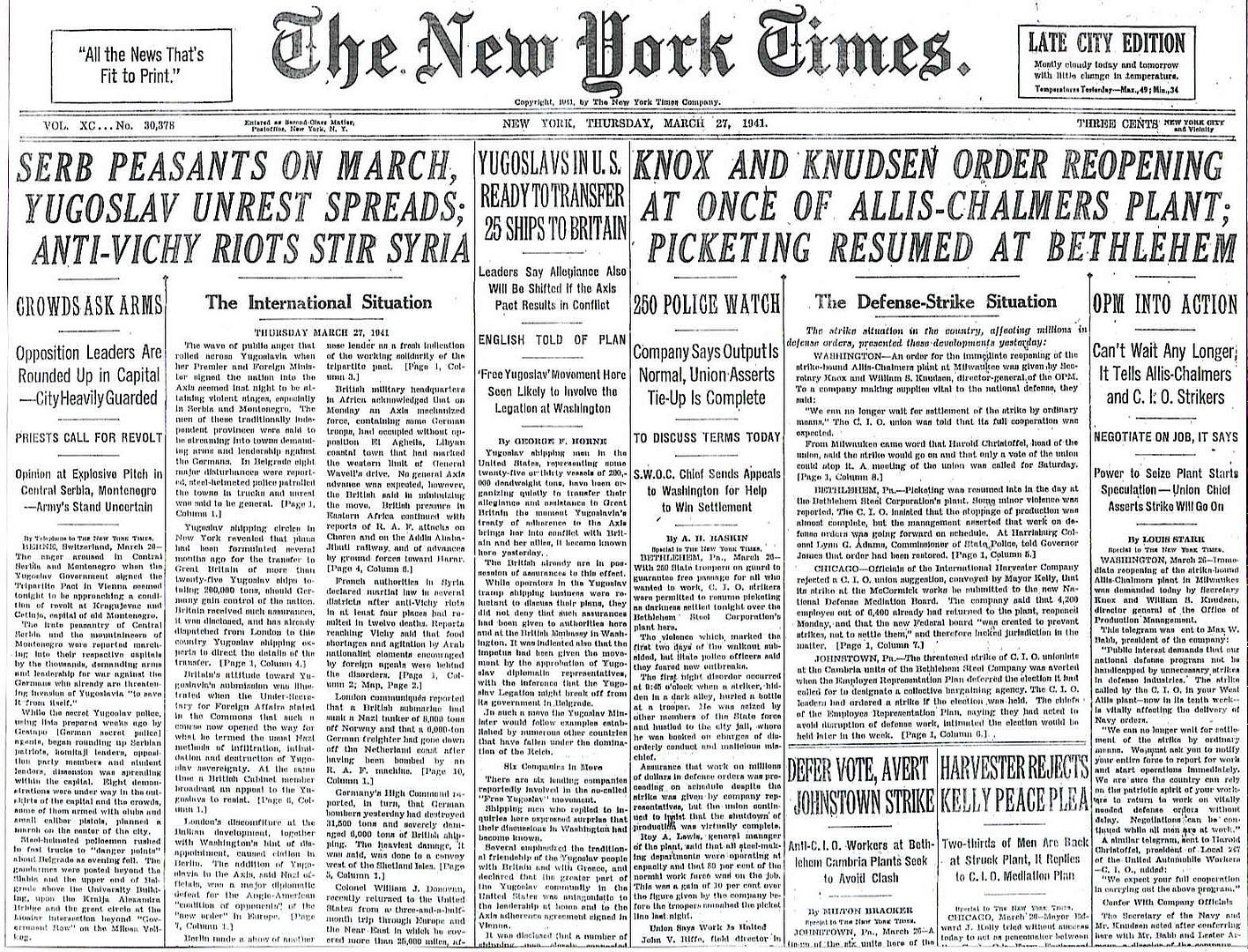
Posted on 03/27/2011 5:55:36 AM PDT by Homer_J_Simpson

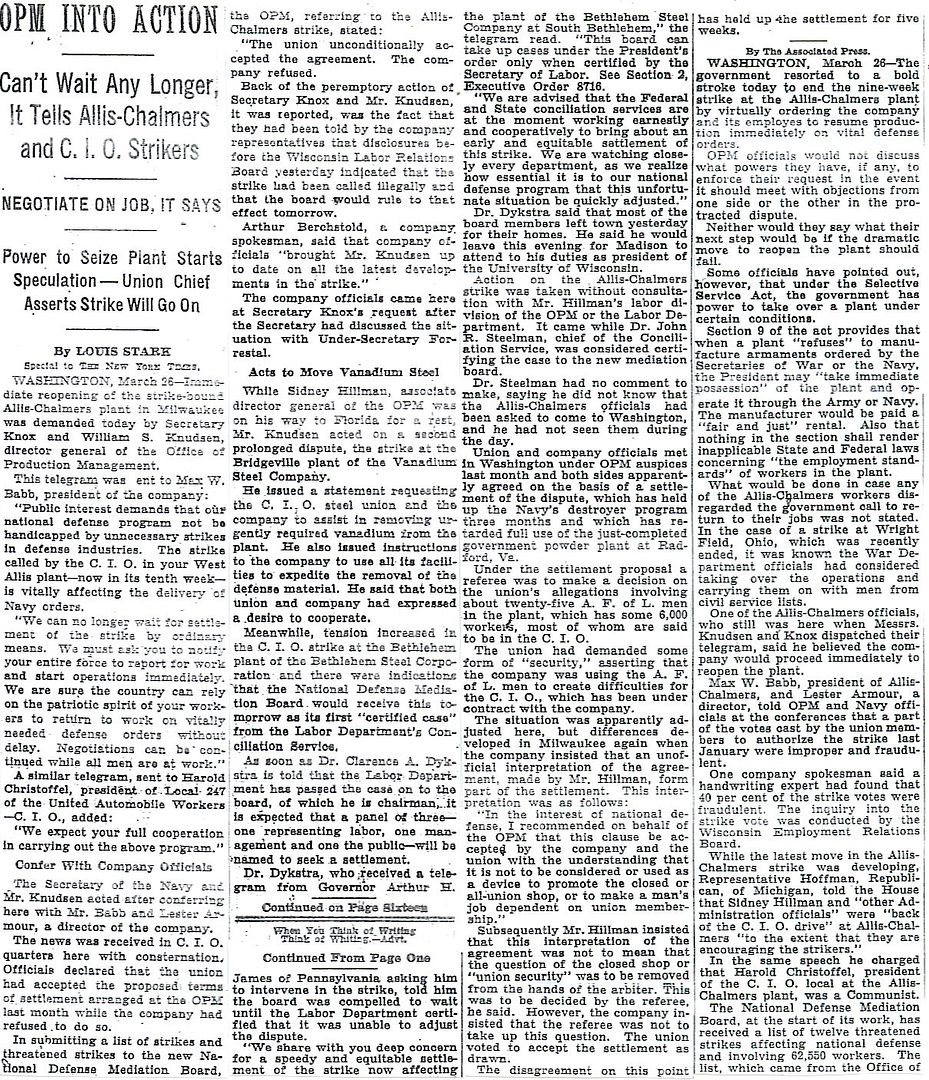
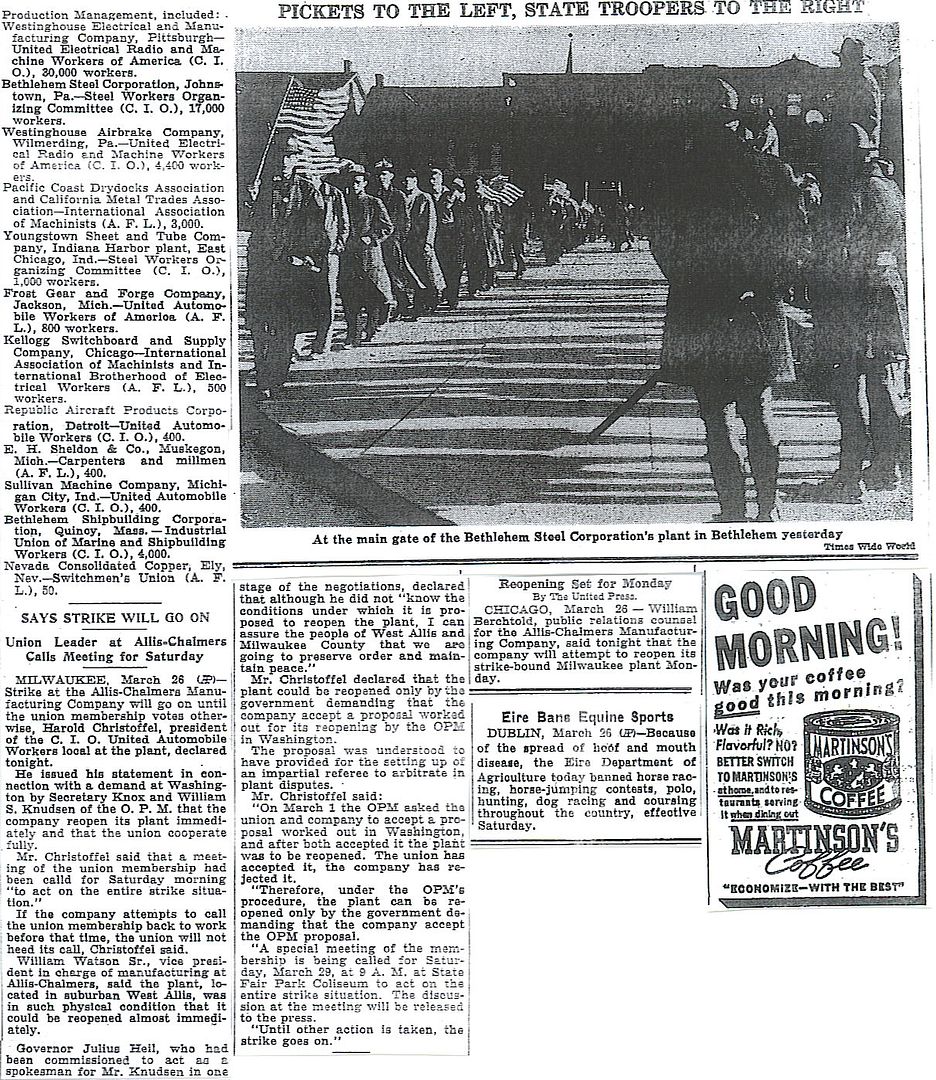
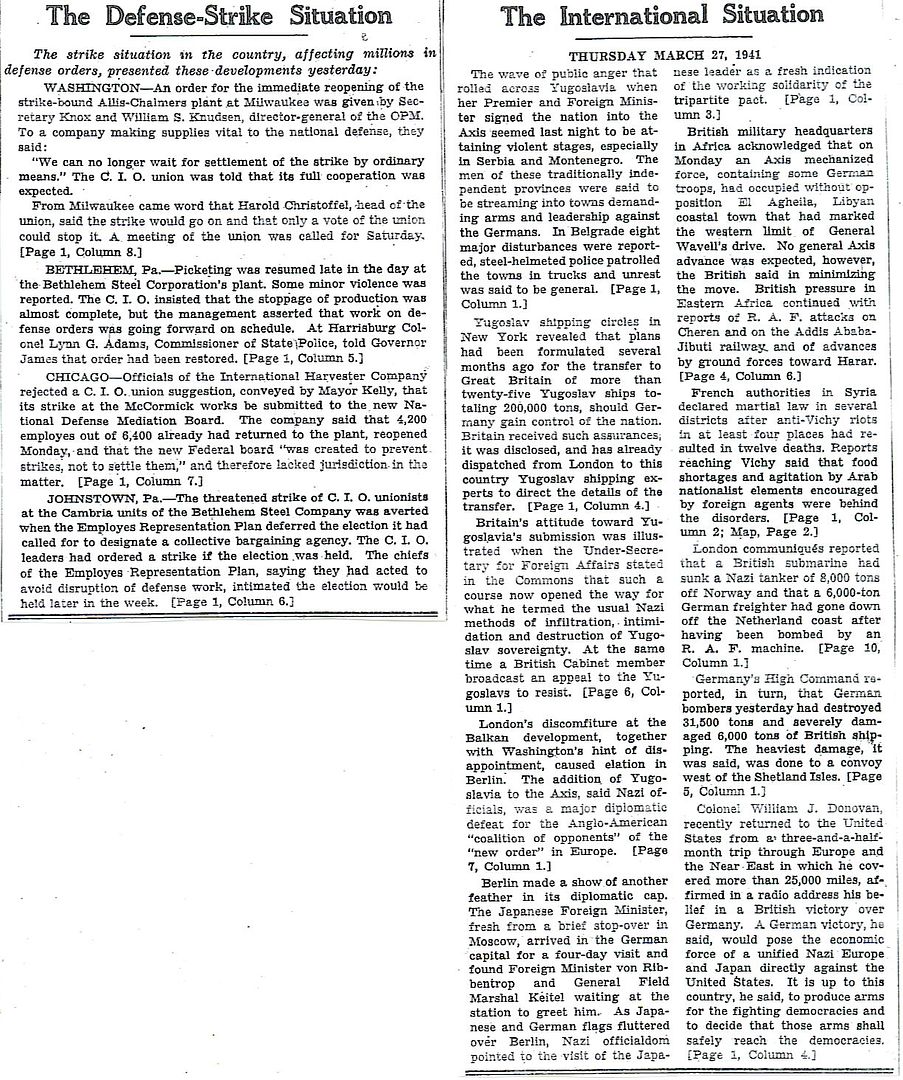
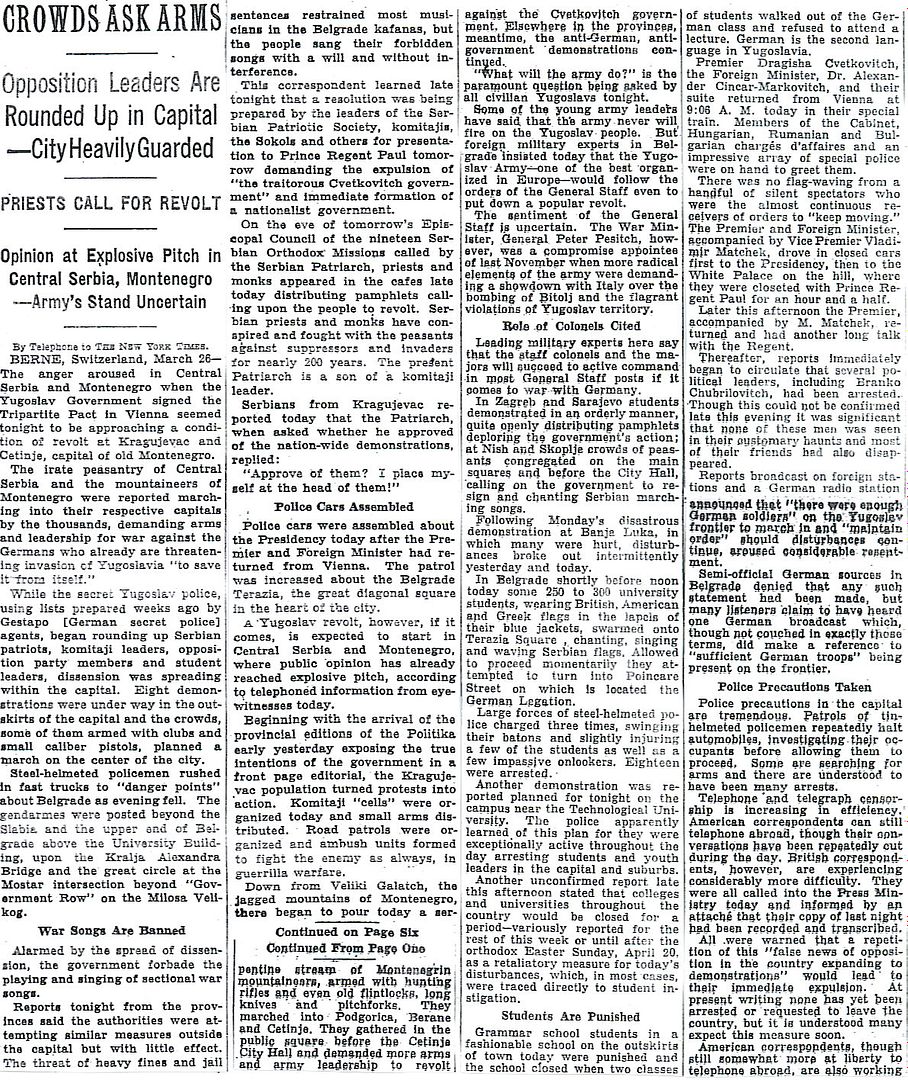
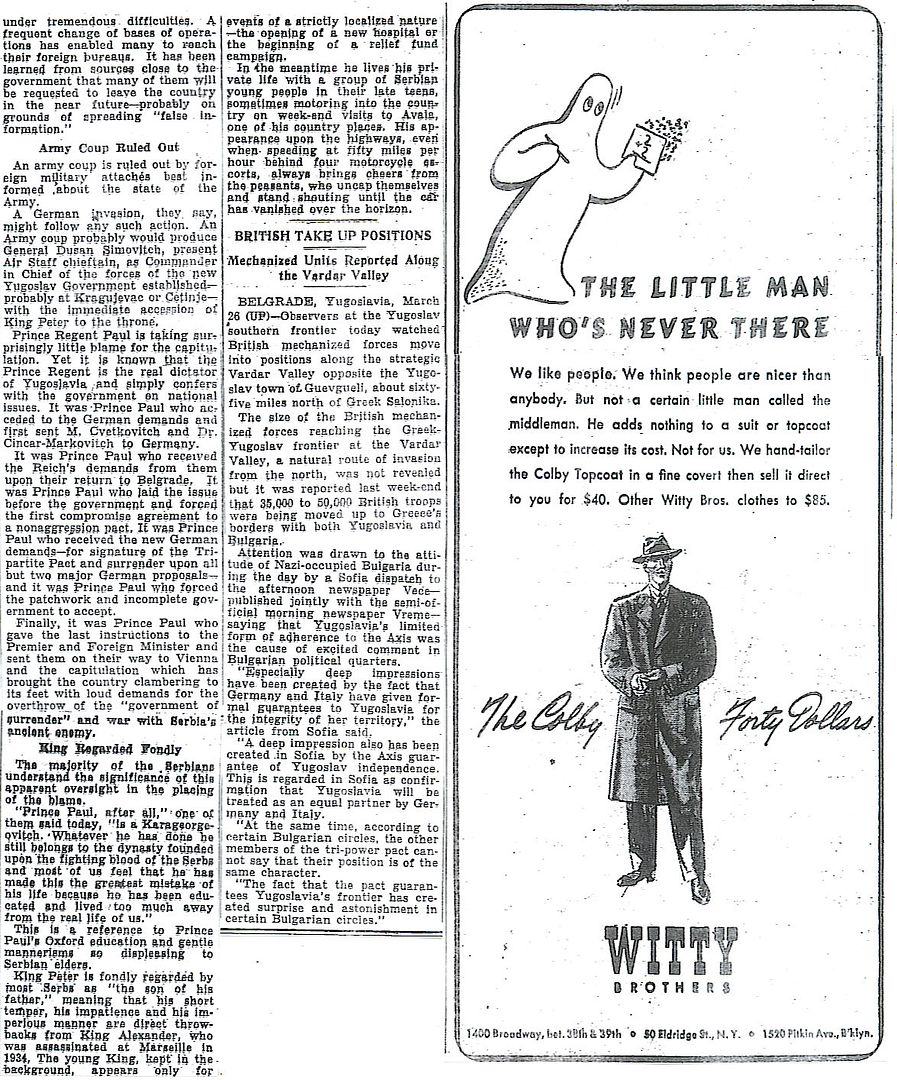
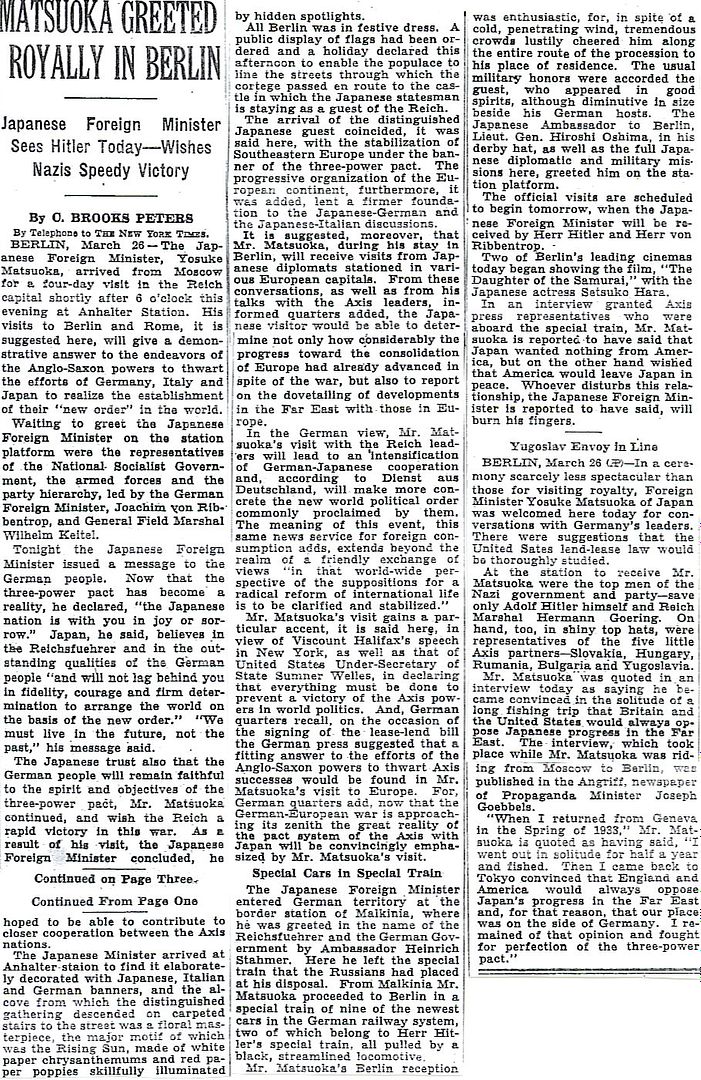
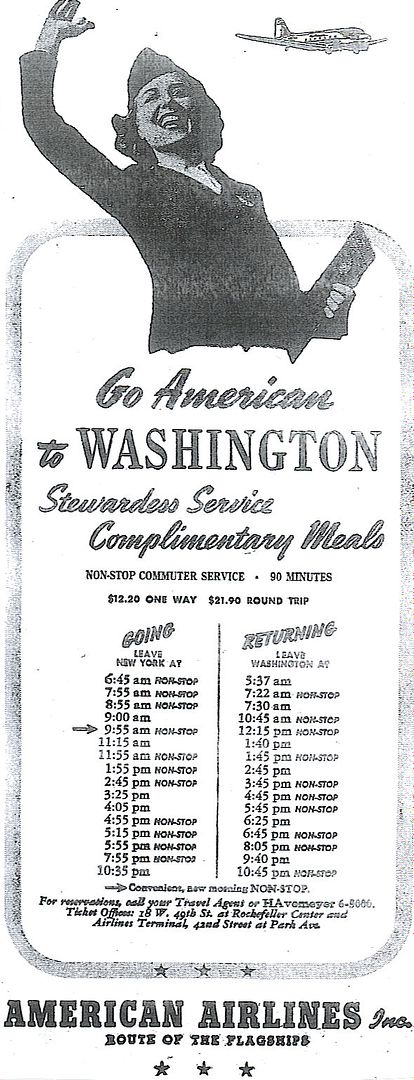
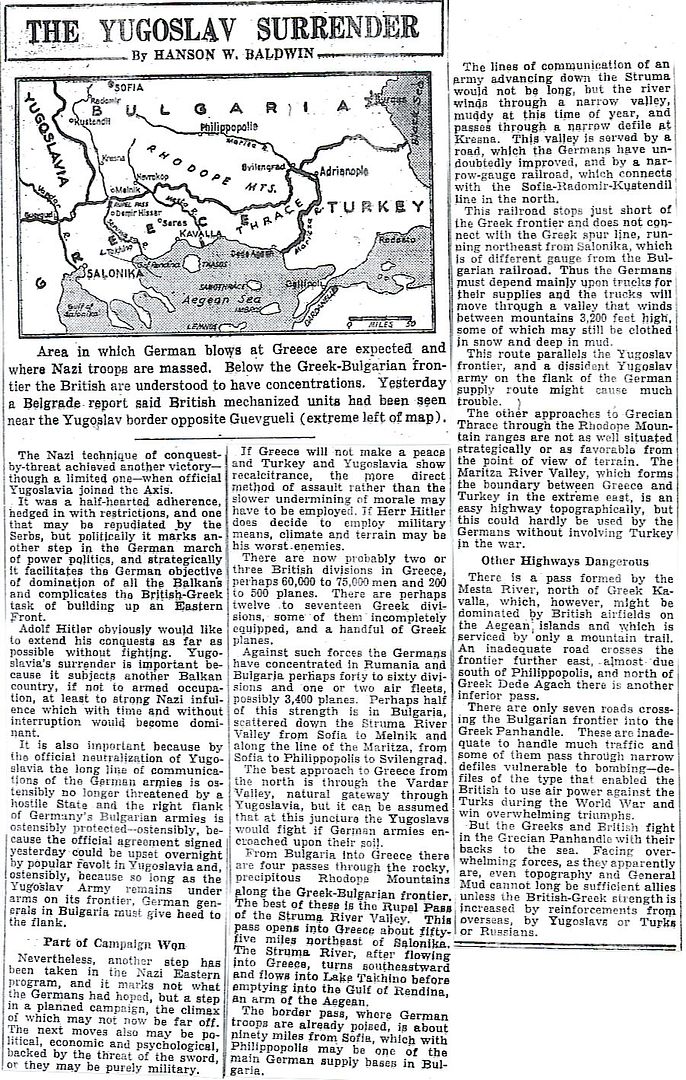
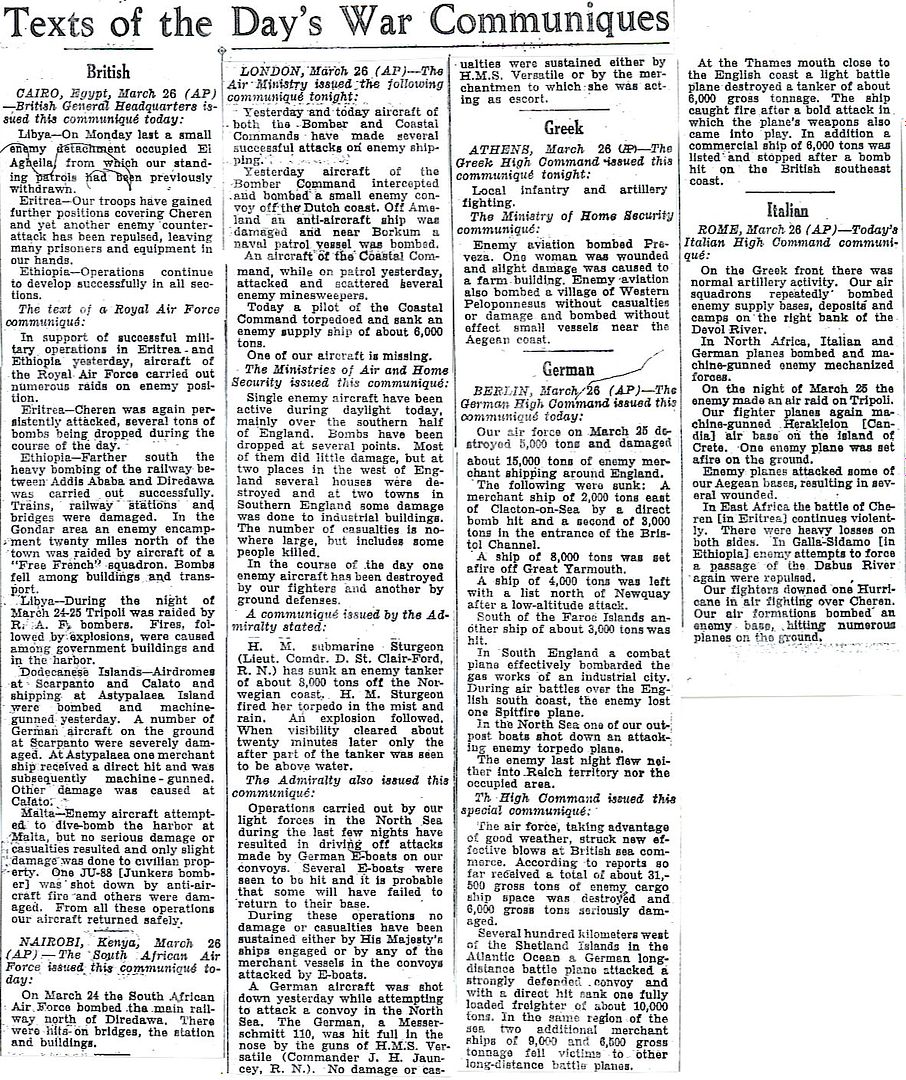
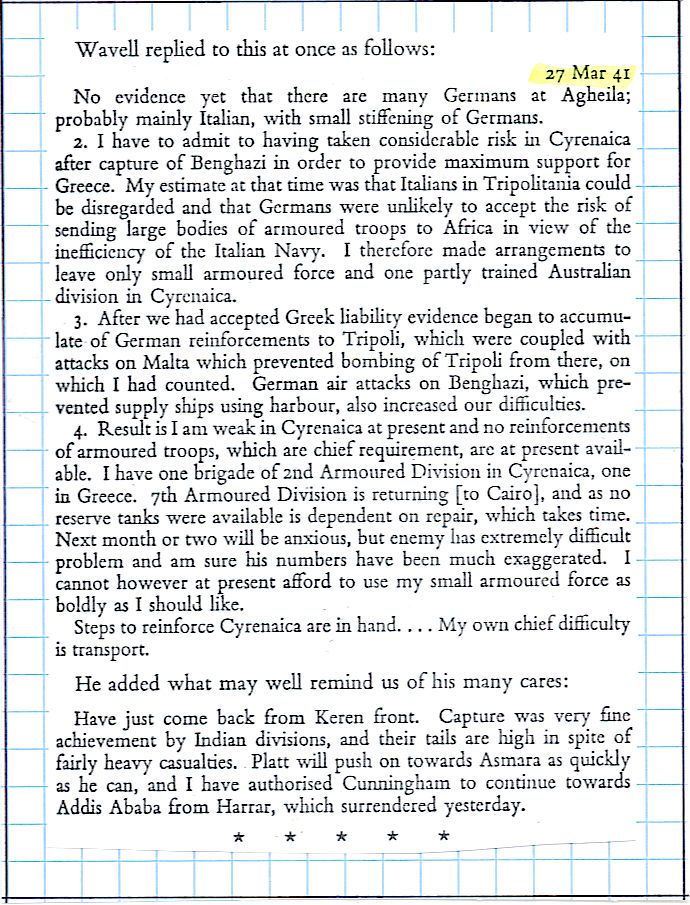
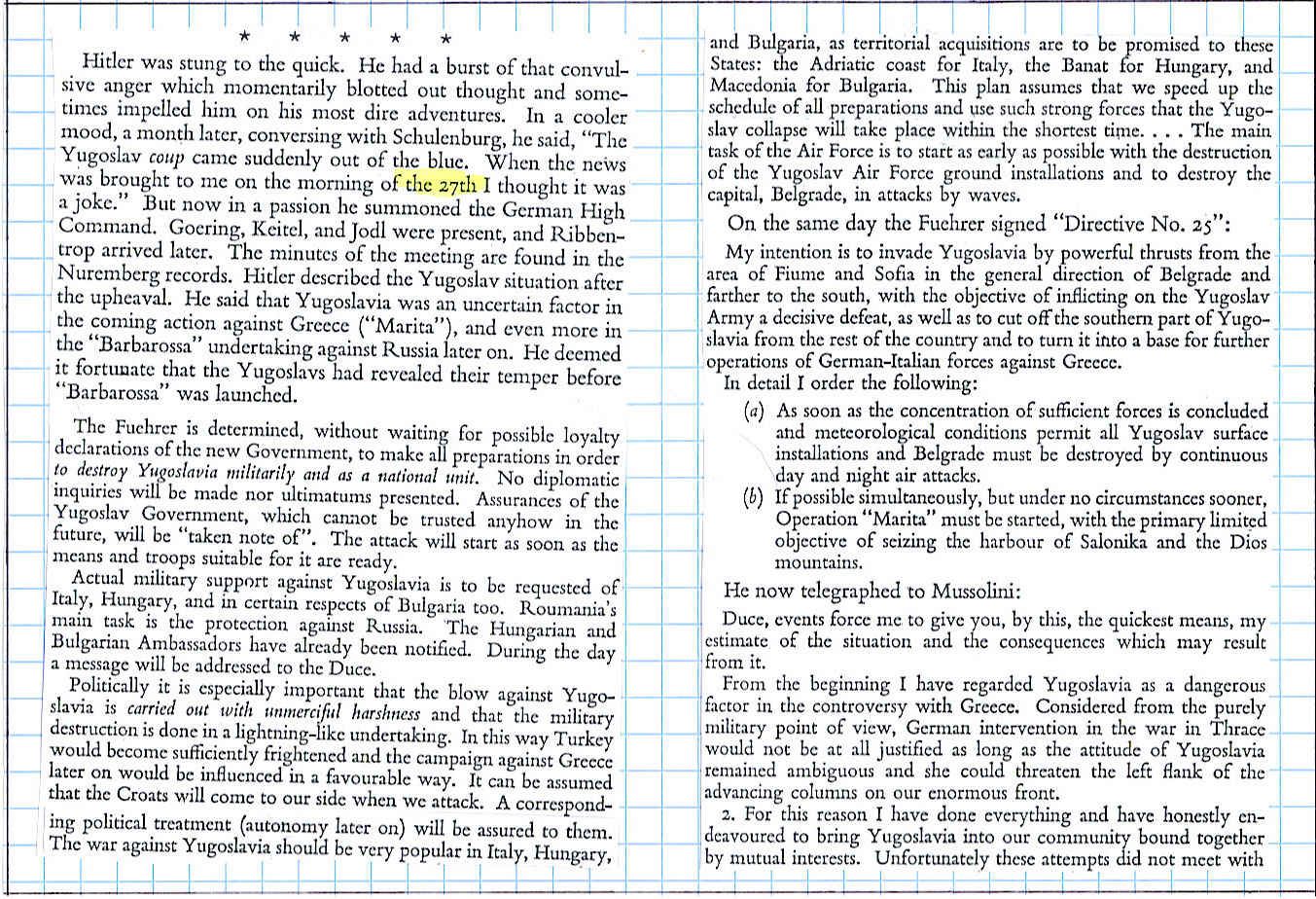
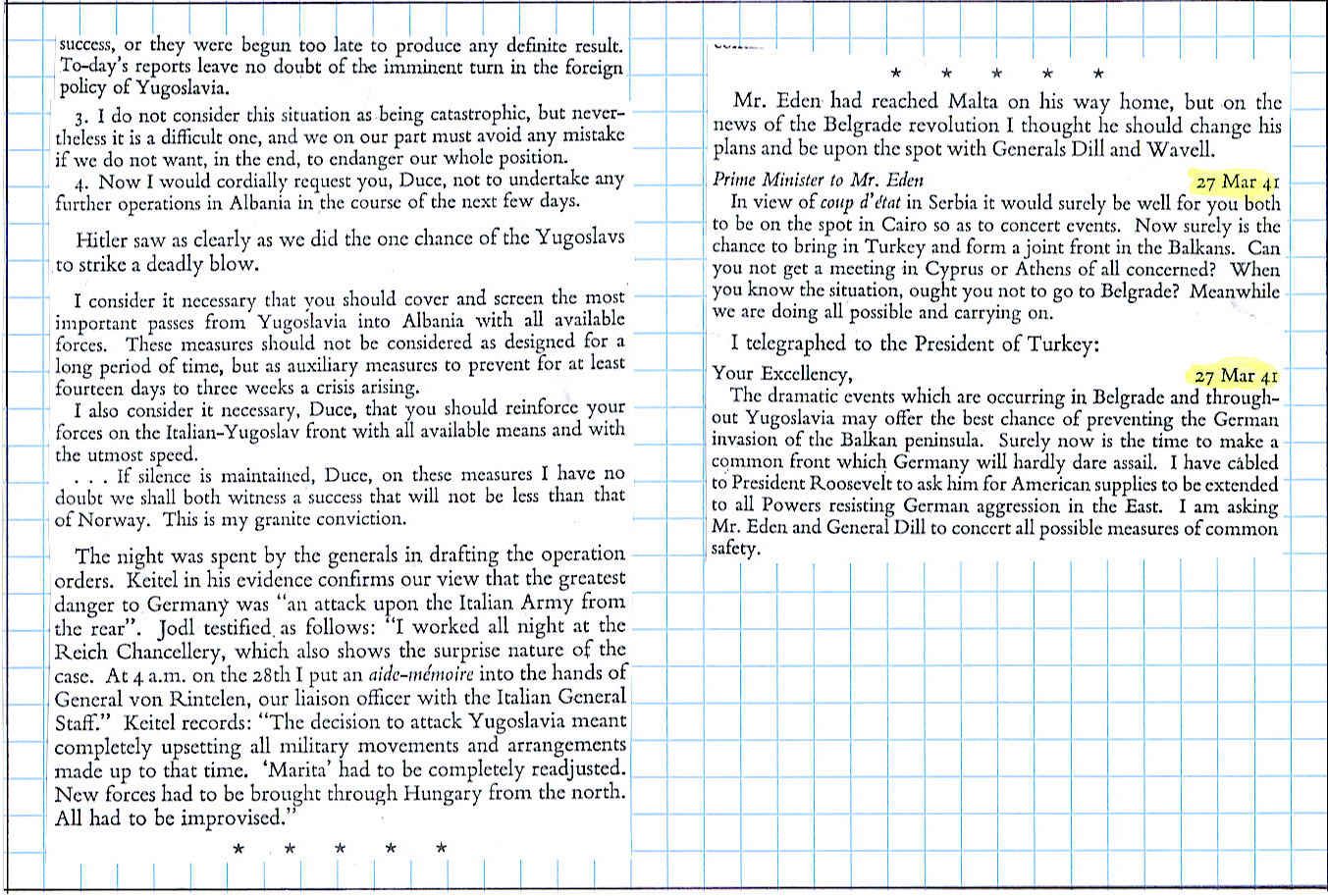
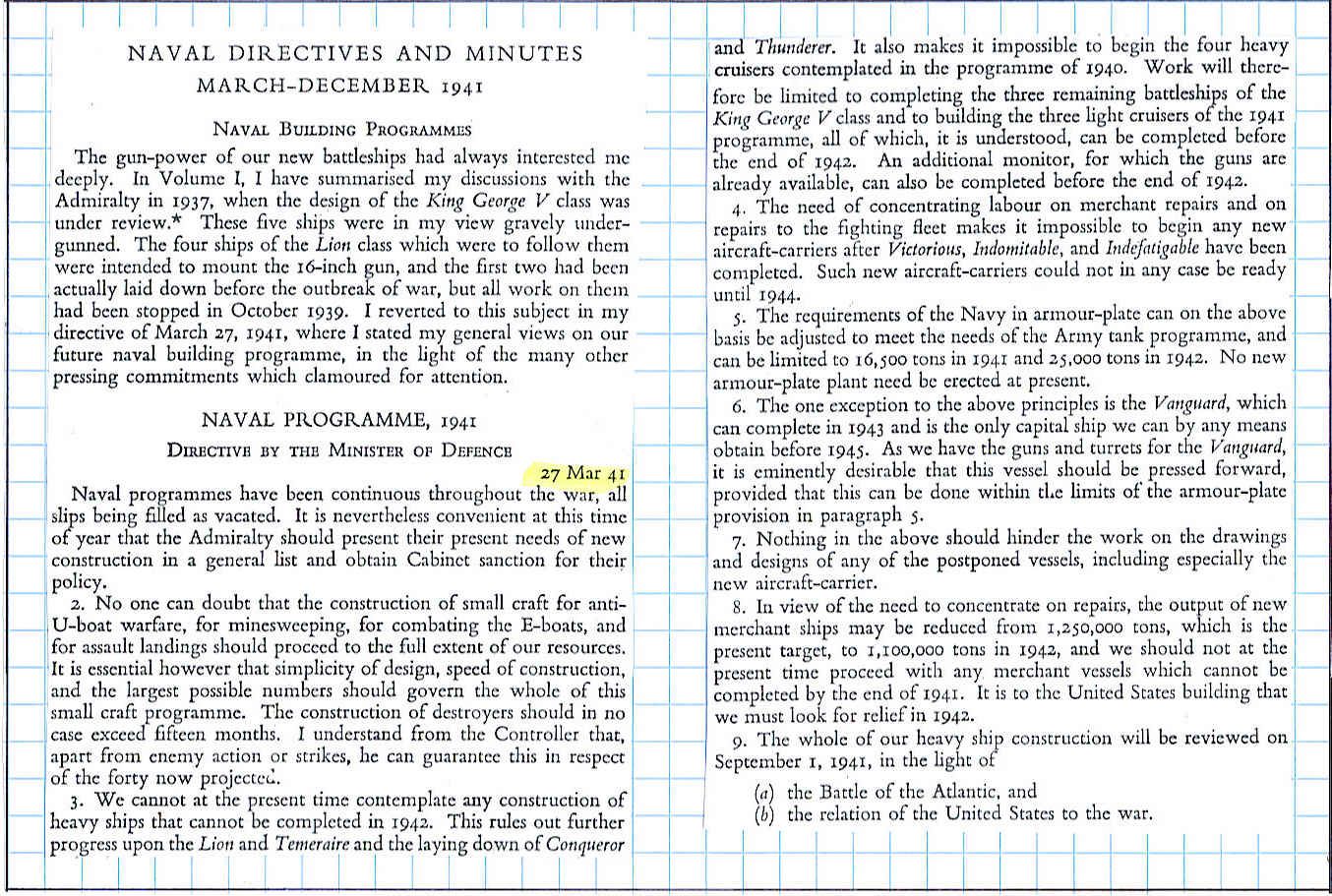
Winston S. Churchill, The Grand Alliance
http://www.onwar.com/chrono/1941/mar41/f27mar41.htm
Coup in Yugoslavia
Thursday, March 27, 1941 www.onwar.com
In Yugoslavia... There is a coup led by air force officers and their Chief of Staff, General Simovic, who becomes the new head of government. The council of Regency and Prince Paul are deposed and the 17-year-old King Peter takes nominal charge of government. British agents have had a hand in bringing the rising about. The change is very popular among the Serbian sections of the population (almost all the leaders of the armed forces are Serbian) but less so with the Croats. In an immediate angry response to the change of government, Hitler issues Directive 25 which order planning for the invasion of Yugoslavia to begin. It is to be mounted as soon as possible and the invasion of Greece is to take place at the same time. Hitler accepts that it may be necessary to defer Barbarossa to allow these new operations to take place.
In Washington... Roosevelt’s $7,000,000,000 Appropriations Bill for Lend-Lease passes into law.
In the Mediterranean... British forces set out to do battle with the Italian fleet. Admiral Pridham-Wippell leads four light cruisers and four destroyers from the Piraeus and Admiral Cunningham the main body of three battleships, one carrier and nine destroyers from Alexandria.
In East Africa... The Allied advance clears the Italian road blocks in the Keren position. The Italian force begins to withdraw toward Asmara. The Indian divisions have lost 4000 casualties in the Keren battles and the Italians 3000 dead as well as many wounded.
http://homepage.ntlworld.com/andrew.etherington/month/thismonth/27.htm
March 27th, 1941
UNITED KINGDOM: The naval base in Trinidad is leased to the United States for 99 years. (Michael Ballard)
GERMANY: Berlin: Hitler flew into a blind rage when he heard that the Yugoslavs had overthrown their pro-Axis government. He ordered military leaders to come to then chancellery in Berlin at once, and for several hours harangued them about the terrible punishment that would be visited on the Yugoslavs.
Demanding an immediate invasion, he said that Yugoslavia must be destroyed with “merciless harshness”. Von Ribbentrop, the foreign minister, was sent off to tell Italy, Hungary and Romania that they would be given pieces of Yugoslav territory. Only the pro-German Croats would be allowed to survive with a puppet state. Hitler then dashed off a midnight letter to Mussolini.
“Today’s reports leave no doubts as to the imminent turn in foreign policy in Yugoslavia. Therefore I have arranged for all necessary measures ... I consider it necessary, Duce, that you should reinforce your forces on the Italian-Yugoslav front with all available means and with the utmost speed.
As Germany’s military chiefs set about implementing the Fuhrer’s new orders, their misgivings increased. Hitler had closed his stormy session by revealing a potentially significant decision. because of the Yugoslav campaign, the launching of Operation Barbarossa would have to be postponed by four weeks.
Berlin
Daily Keynote from the Reich Press Chief:
The sensational news from Belgrade, that King Peter has been placed on the throne by a military coup, should not be reported until the situation is clarified.
BALKANS: Germany send about 500 Luftwaffe aircraft to Bulgaria and Romania.
YUGOSLAVIA: Belgrade: At 2.30 this morning the Yugoslav regency council, headed by Prince Paul resigned; his nephew, King Peter, who is 17, took over and appointed as his prime minister General Dusan Simovich, the chief of the air staff. Simovich organized the coup after two days of anti-Nazi demonstrations. Soon after a radio announcement of the successful coup, King Peter was wildly cheered as he drove through Belgrade. A seething mass of people surged along the streets chanting “Now we are free”. Outside the Soviet legation the crowd were shouting “Long live Britain!”, “Long live Russia!” and “Down with Hitler!”
Belgrade:
The British Reuters News Agency announced:
Prince Paul of Yugoslavia has fled. Former premier Cvetkovich, who signed Yugoslavia’s entry into the Tripartite Pact, has been imprisoned [by his own people in a coup d’état], as have other members of the former government.
MEDITERRANEAN SEA:Battle of Cape Matapan: As ships of the Mediterranean Fleet cover troop movements to Greece, intelligence is received from German and Italian sources that an Italian battle-fleet with one battleship, six heavy and two light cruisers plus destroyers is sailing to attack the convoy routes. ‘Ultra’ indicates that aerial reconnaissance is being arranged in the eastern Mediterranean. Vice-Admiral Pridham-Wippell with cruisers HMS Ajax, HMS Gloucester and HMS Orion and the Australian HMAS Perth and destroyers sails from Greek waters for a position south of Crete. Adm Cunningham with HMS Formidable, HMS Warspite, HMS Barham and HMS Valiant leaves Alexandria to meet the cruisers. (Peter Beeston)
During the battle ADMIRAL CARLO CATTANEO, commander of the Navy’s 1st Division (heavy cruisers Zara, Pola, and Fiume plus destroyers) is killed. He went down with his flagship at the battle of Matapan, in which all three of the aforementioned heavy cruisers were sunk. In a dusk attack by British aircraft, Pola had been torpedoed, and left dead in the water and without electrical power. In the confusion and falling darkness, the ship was not initially missed. When its absence was noted, the Italian fleet commander, Admiral Iachino (who was heading home with his own flagship, the battleship Vittorio Veneto, damaged by an earlier torpedo), believing the pursuing British were much further away, detached Cattaneo with his entire division to search for the cruiser, and, if possible, bring it back to port. Searching for the Pola in the dark (and with his division inexplicably adopting a line-ahead formation that put the cruisers in front with no destroyer screen), Cattaneo ran unsuspecting into the main British battle fleet, which had picked him up on radar (the Italians had no radar at this stage) and was laying in ambush. In an action at point-blank range by naval standards (a little over a mile and a half, or 2,800 yards), Admiral Cunningham’s British battleships and cruisers rapidly sank the Zara and Fiume, along with two destroyers, with the Italians literally unable to fire a shot in their own defence (later that night Cunningham’s force found and sunk the Pola as well). (Michael F. Yaklich)
A flying boat dispatched by Cunningham sights 3 Italian cruisers on a south-easterly heading approximately 320 miles south west of Crete, and Ultra reports confirm the sighting. Cunningham orders British vessels in Alexandria to sail and then conspicuously leaves the port carrying his golf clubs in order to mislead enemy agents. He returns secretly and boards Warspite.
LIBYA: The German 8th Machine Gun Battalion is moved to El Agheila to free the 3rd Reconnaissance Unit for preliminary reconnaissance for the attack on Marsa Brega. (Jack McKillop)
ERITREA: Keren: The Battle of Keren is over. After a 52-day siege against Italian Bersaglieri, Alpini and Caribineri and Eritrean colonials, the British and Free French have won. The Italians have won much respect from those who defeated them. Swiss Radio spoke of the Italian’s “gallant resistance”.
At first the Italians were outnumbered. Even after General Nicolangelo Carmineo brought in reinforcements, their numbers were only equal to the Allies, and they were far worse armed, but the Italian positions were rarely surrendered, and were usually only taken at great cost.
Today the British broke through, leaving a route covered with the bodies of Cameron Highlanders and Savoia Grenadiers. It has cost 536 British lives and 3,229 wounded, and around 3,000 Italian lives and 4,500 wounded.
GREENLAND: German bombers sighted over Greenland’s east coast. The sightings are interpreted as evidence that weather reports are being transmitted from the island to the Luftwaffe. (Jack McKillop)
U.S.A.: Washington: Congress approves spending $7,000 million in Lend-Lease aid. (US $ 79,545 billion in year 2000 dollars. Jack McKillop)
Washington: The secret Anglo-US staff talks (ABC1) which began in January ended today with broad agreement on plans for strategic co-operation in the event of US entry into the war against Germany or Japan or both.
In fourteen meetings since 29 January the two sides have discussed the American plan, put forward by Captain Turner of the US Navy and Colonel McNarney of the US Army, carefully reviewed by the President. The result is plan ABC1. Its main thrust is that Germany must be defeated first. the US would give strategic priority to the Atlantic and to Europe, although the US navy would be used offensively in the Pacific as British staff officers have drawn attention to the vulnerability of Singapore. One US general said: “If we lose in the Atlantic we lose everywhere.”
Carrying a prototype centimetric air-interception radar, a B-18 Bolo makes the first air-to-air contact by a US radar system. Flying over the ocean off Cape Cod, the system showed that it could also register surface targets. (Cris Wetton)
TRINIDAD: Britain leases defence bases in Trinidad in the West Indies to the U.S. for 99-years. (Jack McKillop)
AUSTRALIA: The Australian Shipbuilding Board is established to begin a program of building “River” class frigates of 1,420 tons; these vessels are similar to the Royal Navy’s “River” class frigates. The intention is to built 60 ships at a rate of 12 a year but only six are commissioned during the war and two others in 1946. (Jack McKillop)
Day 574 March 27, 1941
Battle of Keren, Eritrea. At 4.30 AM, tanks and infantry push through the Dongolaas Gorge along the newly repaired road and capture the heights beyond, which dominate the Gorge and the town of Keren. 3,000 Italian troops in the hills around the Gorge gradually surrender. Keren is taken without a fight at 10 AM and Italian troops are pursued as they retreat towards the capital Asmara. Allied casualties are 536 killed & 3,229 wounded, while Italy loses 6,500 killed, missing & wounded.
As the Italian Fleet is known to be at sea from Ultra intercepts, Admiral Cunningham’s Mediterranean fleet (battleships HMS Warspite, Barham & Valiant, aircraft carrier HMS Formidable & 9 destroyers) leaves Alexandria, Egypt. In addition, 4 cruisers & 4 destroyers leave Piraeus, Greece. A Sunderland flying boat is sent out ‘spotting’ as a pretext. The Italian warships are located at noon without the promised Luftwaffe air cover.
Coup d’etat in Yugoslavia. Crowds in Belgrade spit at the German Ambassador. Inspired by anti-Nazi sentiments and vague British promises of military help, Air Force General Dušan Simović seizes power (deposing Prime Minister Dragiša Cvetković on his return from Vienna). Regent of Yugoslavia, Prince Paul is replaced with 17 year-old heir to the throne King Peter II (he and new Prime Minister Simović intend to renounce the Tripartite Pact). On hearing the news, Hitler orders Yugoslavia to be invaded along with Greece, diverting 29 divisions and 2000 aircraft to the Balkans from the planned invasion of USSR (Operation Barbarosa).
At 1.50 PM 400 miles Southwest of Iceland, U-98 sinks British SS Koranton (all 34 hands lost). In the same area, Oberleutnant zur See Helmut Pöttgen falls overboard from U-46 and is lost.
Was the AC plant opened on Monday? Did the men go back to work?
Not for a while. Around April 7 the tear gas will clear out and they can reopen.
The Yugoslav Army was disposed in three groups. Army Group I, based on Zagreb, was facing us across the frontier; Army Group II was covering the approaches from Hungary; and Army Group III, with the bulk of their troops, was disposed along the borders of Rumania, Bulgaria, and Albania. The strategic position of the Yugoslavs was most unfavorable, and when hostilities began they had only succeeded in mobilizing two-thirds of their twenty-eight divisions and three cavalry divisions. They lacked modern equipment, there was no armor at all, and the air forcé possessed only three hundred machines.
The military weakness of Yugoslavia was accentuated by political, religious, and racial divisions. Apart from the two main groups, the Serbs and the Croats, there were millions of Slovenes, Germans, and Italians, each with separate national aspirations. Only the Serbs were really hostile to us, and our propaganda took the line of offering liberation to the other races, and particularly the Croats. At array headquarters we had a Propaganda. Company, working under my supervision and staffed by various language experts. We learned that the formations facing us [in Austria] were chiefly Croatian, of whom only about a third of the personnel on paper had obeyed the mobilization order. The Propaganda Company worked at top speed, preparing pamphlets and loudspeaker records to put our opponents in a receptive mood for surrender
So it took three days for the British to acknowledge that the they had lost some ground to Rommel in Libya. Germany is still completely silent of the event. I can't wait to see what kind of lag there will be on the events next week then.
I also was wondering at what point there would be mention of the possibility of invoking that little amendment on the Selective Service bill that allows the government to take over companies that are failing to support the defense manufacturing effort. Fundamentally, I was against this amendment especially considering that it was tacked onto a bill that was considering a completely different matter (I really hate that and think that it amendments to bills should only be in direct concern of the purpose of the bill). However, if the government takes over some of these plants to crack down on these unions that are clearly showing that they have a long history of anti-American activities then I wont shed a bloody tear that's for sure.
"When I mentioned the matter of the linking up of both my panzer groups in the Minsk area and the difficulties of their subsequent advance from there, I received no clear statement on it, the same sort of answer Tresckow had received in Berlin recently. The question is important, for between Minsk and the 'gateway to Smolensk' - the land bridge between the Dniepr and the Dvina - lie the marshes from which the Beresina springs; massing armored forces near Minsk would therefore be very detrimental to their further forward movement"
I find this interesting since when it is put into practice, the encirclement around Minsk leaked like a sieve. I can't help but wonder how bad it would have been had moved deeper in their initial encirclement.
It more than likely would have been much worse. The Minsk encirclement “leaked like a sieve” because, even at that stage, the German infantry was beginning to lag seriously behind the Panzers and mechanized infantry [keeping in mind that only about 10% of the German Army was mechanized or motorized].
In using a deeper envelopment at Minsk, the practical result would have been that the Panzers would have been even further away from the infantry, and the “Kessel” would have been a great deal bigger.
My point exactly.
Those numbers, while no-doubt accurate in terms of inflation, are very misleading in in explaining the relative US efforts required.
They make it look like Lend-Lease was not such a big deal.
But in 1941, total US GDP was only $127 billion, meaning a Lend-Lease valued at $7 billion was worth nearly 6% of our GDP.
In today's money, that would be just under $1 trillion!
In other words, FDR's Lend Lease to Britain then was roughly equivalent to the total cost of our efforts in Iraq -- and more than today's total annual defense budget.
Or, you could say: to just one Obama "stimulus" bill.
Disclaimer: Opinions posted on Free Republic are those of the individual posters and do not necessarily represent the opinion of Free Republic or its management. All materials posted herein are protected by copyright law and the exemption for fair use of copyrighted works.